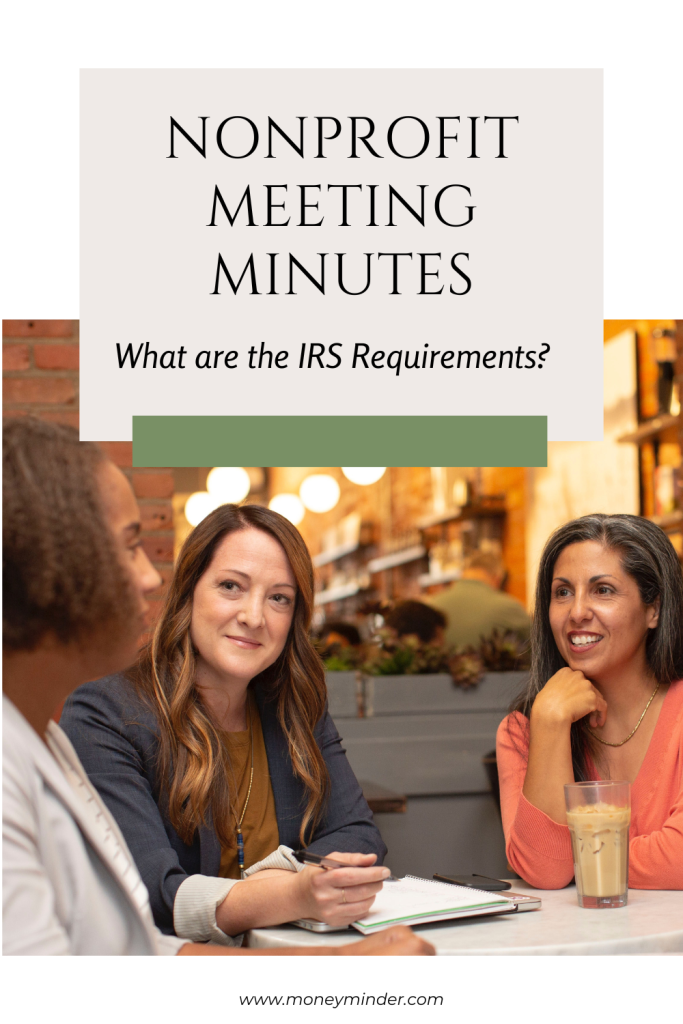501(c)(3) board members make sure an organization follows the rules, looks after its money, and plans for its future. Board members need to be honest, and the IRS has published guidance in their Good Governance Practices document to guide them. This document underscores the IRS’s belief that a well-governed organization is more likely to operate effectively and consistently with the law. In it, they have a lot of good recommendations about how to structure an organization’s mission, organizational documents, board members and governance. These are good, strong recommendations from the IRS in order to ensure effective operation and compliance with the law.
So, what does the IRS guidance say about nonprofit meetings and 501(c)(3) minutes? Let’s break it down.
What are Meeting Minutes?
Meeting minutes are the official written record of the discussions, decisions and actions taken during an organization’s meetings. These could be Board Meetings, Committees or other key groups within the organization. The minutes help to demonstrate that the tax-exempt organization is operating in accordance to its mission and in compliance with legal requirements.
What Should You Put in Your Nonprofit Meeting Minutes?
- Meeting Details (board member names, time, location)
- Attendees
- Absentees
- Call to order
- Officer & committee reports
- Old Business
- New Business
- Other Items
- Action Items
- Adjournment
Get more details and sample meeting minutes in our free Masterful Meetings guide!

IRS: Record Your Meeting Minutes

The IRS recommends that leadership or sub-committees (often the “Secretary”) promptly and accurately record minutes of their meetings, including any decisions that were made or actions that were taken.
The Internal Revenue Service encourages the governing bodies and authorized sub-committees to take steps to ensure that minutes of their meetings, and actions taken by written action or outside of meetings, are contemporaneously documented.
– IRS Good Governance Practices
This means that nonprofits should keep thorough and up-to-date records of their activities and decisions as a good practice. This demonstrates transparency, accountability and compliance.
IRS Meeting Minute Requirement on Form 990
The IRS also requires all organizations that file a Form 990, a tax return form required by the IRS for tax-exempt organizations, to answer a question about minutes and documentation. The question is in Part VI, Line 8, and indicates whether the organization documents meetings and other actions taken by the governing body during the year.
This requirement emphasizes the importance of keeping detailed records of meetings and other major actions for compliance and transparency purposes.
Need help with the IRS meeting minute requirement and other federal tax forms? Download our nonprofit federal tax guide here.
Make Your Meetings More Manageable
Our Nonprofit Meeting guide includes a typical order of events for meetings, a meeting minutes outline, a sample nonprofit meeting minutes, sample meeting agenda and a sample meeting script. Talk about hitting the easy button for your next meeting!

 Connect your Venmo account to MoneyMinder PRO to directly download transactions, saving you time and effort. You just review the transactions to ensure they are properly categorized and fill out any required fields.
Connect your Venmo account to MoneyMinder PRO to directly download transactions, saving you time and effort. You just review the transactions to ensure they are properly categorized and fill out any required fields. Connect your Bank, Paypal and Square accounts to MoneyMinder PRO to directly download transactions, saving you time and effort. You just review the transactions to ensure they are properly categorized and fill out any required fields.
Connect your Bank, Paypal and Square accounts to MoneyMinder PRO to directly download transactions, saving you time and effort. You just review the transactions to ensure they are properly categorized and fill out any required fields. Connect your Bank, Paypal and Square accounts to MoneyMinder PRO to directly download transactions, saving you time and effort. You just review the transactions to ensure they are properly categorized and fill out any required fields.
Connect your Bank, Paypal and Square accounts to MoneyMinder PRO to directly download transactions, saving you time and effort. You just review the transactions to ensure they are properly categorized and fill out any required fields. Join It is a membership management service that helps businesses and nonprofits effectively sell, track, and grow their membership.
Join It is a membership management service that helps businesses and nonprofits effectively sell, track, and grow their membership. Connect your Bank, Square and PayPal accounts to MoneyMinder PRO to directly download transactions, saving you time and effort. You just review the transactions to ensure they are properly categorized and fill out any required fields.
Connect your Bank, Square and PayPal accounts to MoneyMinder PRO to directly download transactions, saving you time and effort. You just review the transactions to ensure they are properly categorized and fill out any required fields.
Should meeting minutes be posted and made available to membership?
Should organization have a mission statement?
Should a detailed balance sheet/ budget be made available to membership? Should it be posted?
Should an annual audit be be conducted and the results be made available to membership?
These comments are just a few that have come up in discussion because membership of my country club, which is non-profit, cannot seem to get these records to review. An audit of our country club needs to be conducted and a review of how meetings are conducted and minutes be reviewed.
Hi Mark,
Those are all good questions. Maybe this document could help: https://www.irs.gov/pub/irs-tege/governance_practices.pdf
How many years are Minutes of Meetings required to be held?
Hi Steve,
This document on the IRS website may help answer your question. It looks like Record Retention Periods is addressed on page 17. https://www.irs.gov/pub/irs-pdf/p4221nc.pdf